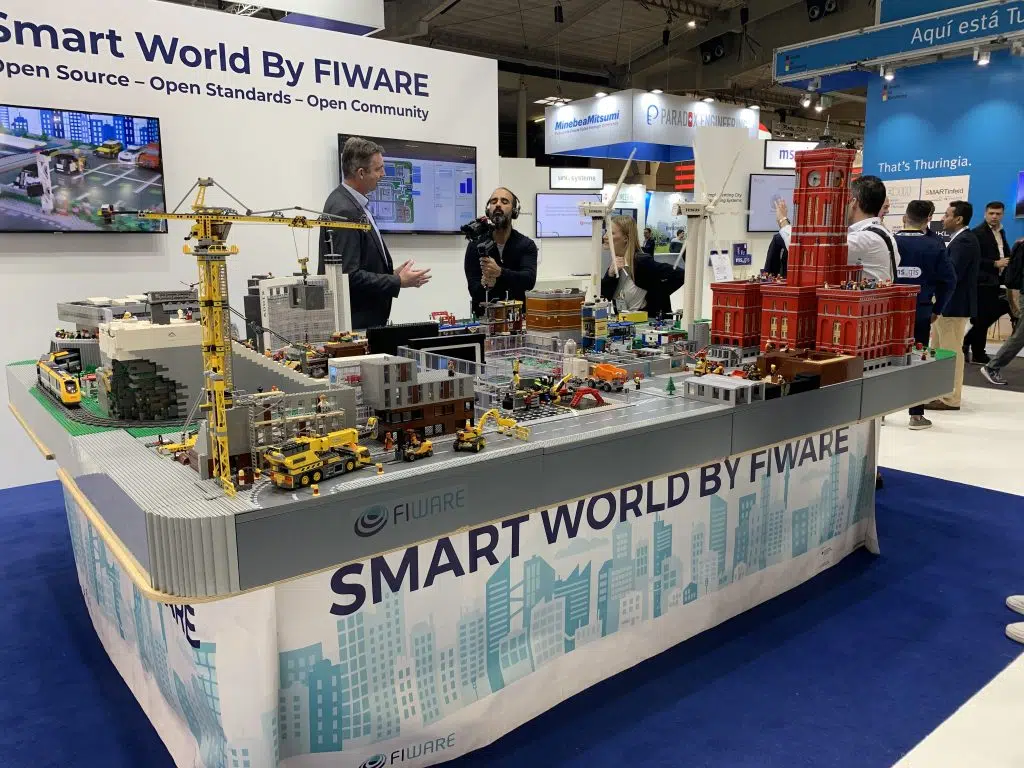Smart City Expo World Congress 2023: The Digital Twin and AI Make Cities Smarter

Fira de Barcelona opened its modern exhibition center in Gran Via, Barcelona, to host this year’s Smart City Expo World Congress. The spotlight was on improving life in urban areas and driving local actions to make urban infrastructures and administrations smarter and more sustainable. There were discussions about buildings and urban planning, mobility, and the blue economy. All in all, the Smart City Expo World Congress hosted more than 1,000 visitors and welcomed over 25,000 attendees from around the world. In this blog post, we will zoom in on the most interesting projects that were displayed.
From a technology perspective, the attention was centered on the Internet of Things (IoT), the digital twin, and artificial intelligence (AI). IoT has been considered a trending topic for many years now but has never really picked up as much momentum as the private sector had hoped. This seems to be gradually changing, however. At PAC, we observe increasing maturity regarding IoT use cases. The Smart City Expo World Congress 2023 showed that the same could be said for the public sector. Vendors such as Wipro and SAS, but also places like Santo André (Brazil) and Singapore, showcased how IoT sensors can be deployed to check the water level in canals and sewers, gather data on congestion, and more.
Companies like Siemens and Dassault Systèmes presented their digital twin solutions. More interestingly, though, many cities showcased the digital twins they had created, and how they were deploying it. Among them was the City of Munich, which started its digital twin project in 2019 and is now using it for urban planning and to make the city more climate-friendly. Singapore is certainly one of the most advanced countries regarding the application of digital twins. The island nation relies on them for flood management, screening the number of taxis and public buses currently on the road, and planning the installation of charging stations for electric vehicles. Additional digital services for citizens will be introduced in the coming years.
One aspect that makes IoT and digital twins so much more attractive is the development of artificial intelligence. While the technology certainly creates a lot of controversy, the analytical capabilities of AI are also helpful for cities that need more accurate insights. On a smaller scale, this can translate into projects such as identifying potholes in the streets through cameras with visual inspection on buses or recognizing patterns in larger data sets related to traffic and emissions. In a broader context, that data is used to keep digital twins up to date, but also to run precise simulations on traffic, noise, climate, etc. at the district and city levels.
In our opinion, one aspect was missing when participants discussed how to leverage modern technologies best to enhance life in cities: IoT, the digital twin, and AI are definitely useful technologies when it comes to urban planning and city maintenance; however, they also hold great potential to engage more with residents and provide digital services. For instance, digital twins are a great way to demonstrate the impacts of development projects on cities and educate citizens on why these changes are necessary. AI can help with the automation of specific administrative tasks. Similar to its deployment in the private sector, it can also turn into a “clerk’s assistant” and advise on how to handle different cases best. These are only some of the benefits that can impact the relationship between governments/cities and their citizens. Although Salesforce and the City of Munich also talked about these kinds of projects, they were rather scarce at the Smart City Expo World Congress 2023.
Still, the event showed that cities and countries understand that they need to break up the data silos within their administrations to make better progress. Cities are actually webs of various systems related to administration, mobility, utility, sewage, and more. For technologies like digital twins and AI to really bear fruit, different stakeholders from within and outside the administration must be willing to share their data and collaborate. The Smart City Expo World Congress 2023 has illustrated that this is exactly what is happening now.